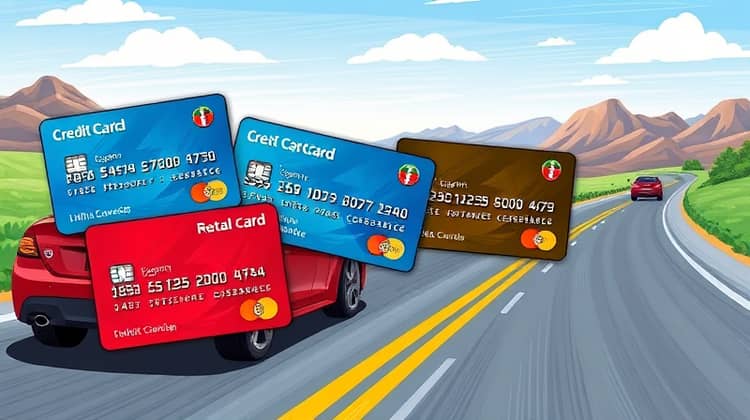Credit Card Rental Car Insurance: What You Need to Know Before Renting

Renting a car can be a straightforward process, but understanding the ins and outs of rental car insurance can be quite complex. One vital component that many people overlook is the insurance coverage provided by credit cards. Knowing how credit card rental car insurance works can save you money and provide peace of mind when you're on the road.
In this blog, we will delve into the details of credit card rental car insurance, exploring how it functions, the types of coverage it offers, and important steps you should take before relying on it during your next car rental. This knowledge will empower you to make informed decisions, ensuring that you're adequately protected while traveling.
Understanding Rental Car Insurance

Rental car insurance can often feel like an additional burden on top of your travel expenses, but it is a crucial part of the rental process. Most people are required to understand the various coverage options available to them so they can choose the right one that suits their needs. This is where confusion often arises, leading many to question what exactly is necessary for a safe and worry-free rental experience.
There are typically several types of coverage available when renting a car, including collision damage waivers, liability coverage, and personal accident insurance. Each of these plays a different role in protecting you and your finances in the event of an accident or damage to the vehicle. It's essential to take the time to familiarize yourself with these options to make an informed decision.
- Collision Damage Waiver (CDW)
- Liability Insurance
- Personal Accident Insurance
- Uninsured/Underinsured Motorist Coverage
- Roadside Assistance
By understanding these different types of rental car insurance, you can evaluate what you may already have coverage for through your own policies or your credit card, potentially saving you from purchasing unnecessary extra insurance.
The Role of Credit Card Insurance

Credit card companies often provide a form of rental car insurance as a perk to their cardholders. This insurance is typically offered as secondary coverage, which means it activates only after your primary insurance has been exhausted. Understanding how this works can lead to significant savings and simplify the rental process during your travels.
In many cases, the credit card rental car insurance covers damages to the rental vehicle, offering peace of mind while driving. However, it is essential to carefully read the specific terms and conditions of your credit card, as benefits vary widely by issuer and card type.
How Credit Card Rental Car Insurance Works

When you rent a car using a credit card that offers rental car insurance, you automatically benefit from the coverage provided by the card company. This protection typically extends to collision damage, theft, and some related expenses resulting from an accident or incident outside of your control.
To access this coverage, you usually must decline the rental agency's insurance options and pay for the rental with the credit card that offers this benefit. It's also important to note that credit card rental car insurance may only cover specific vehicles and situations, such as rental cars, and will not apply if you're driving a personal vehicle or if the car is being used for ridesharing.
Additionally, many credit card policies require that you report any damage or theft to them as well as the rental company, which illustrates the importance of following proper procedures for a successful claims experience.
Types of Coverage Offered by Credit Cards

Credit cards provide various forms of coverage when renting a car, but it's essential to be aware of the limits and restrictions of each type. While most cards offer some level of liability and collision coverage, you should understand what you can expect to receive during your rental experience.
be sure to check if your credit card insurance includes the following types of coverage when you rent a car:
- Collision Damage Waiver (CDW)
- Theft Protection
- Liability Coverage
- Medical Payments Coverage
- Roadside Assistance
Being aware of the various types of coverage available through your credit cards allows you to make more informed decisions when considering purchasing additional insurance from the rental company.
Steps to Take Before Relying on Credit Card Insurance

Before you decide to rely solely on your credit card for rental car insurance, it’s crucial to take some proactive steps to ensure your coverage is valid and comprehensive. Understanding how your specific card operates can save you from potential headaches later on.
Start by reviewing your credit card’s insurance policy documents. Ensure that car rentals are covered and check the limits and exclusions carefully so that you can act confidently during your rental experience.
- Review the terms of your credit card's rental car insurance policy.
- Contact your credit card company to confirm coverage and any limitations.
- Make sure you use the correct credit card for your rental transaction.
- Decline the rental company's insurance options when picking up your vehicle.
Taking these steps will help to ensure that you're prepared and informed, making for a smoother rental experience overall.
Combining Coverages

In some cases, you may want to combine coverages to maximize your protection. For instance, if you have personal auto insurance that covers rentals, you might not need to rely solely on your credit card insurance. Understanding how these policies work together can be beneficial as you navigate different car rental scenarios.
Combining your personal insurance with credit card benefits can sometimes provide more comprehensive coverage than either would offer alone, but make sure to double-check the details to avoid gaps or overlaps.
- Analyze coverage from both your personal auto insurance and credit card insurance.
- Assess whether additional insurance from the rental company may be required or beneficial.
- Determine the best combination of coverages for your specific rental needs.
By thoughtfully considering how to combine different type of coverages, you can tailor your insurance to fit your unique travel situation better.
Potential Pitfalls and Exclusions

While credit card rental car insurance offers valuable benefits, it is not without potential pitfalls. Certain exclusions may prevent you from receiving coverage in specific situations, so it's crucial to read the fine print carefully.
Common pitfalls include restrictions related to the type of vehicle rented, the location of the rental, and the circumstances of the accident or loss. Additionally, coverage may not apply if the driver is not listed on the rental agreement or if reckless driving occurred.
- The credit card insurance may not cover luxury or exotic rentals.
- Liability for damages may not apply in certain countries.
- Personal use limitations might exist, where the card’s coverage only accounts for business-related rentals.
- Exclusions may apply for larger vehicles like trucks or vans.
By familiarizing yourself with these potential pitfalls and exclusions, you can avoid costly mistakes and ensure a smoother rental experience.
Making a Claim

If an incident occurs while you're renting a vehicle, knowing how to file a claim with your credit card company for rental car insurance is critical. Often, you will need to provide specific information and documentation to support your claim, which is why staying organized is essential.
To start the claims process, follow the established guidelines set by your credit card provider, which usually includes contacting them promptly after the incident and submitting necessary paperwork as required.
- Notify your credit card issuer about the incident as soon as possible.
- Gather all relevant documentation, including the rental agreement and accident report.
- Fill out any claim forms provided by your credit card company.
- Submit your claim and follow up to check on its status.
Understanding this process ahead of time ensures you can effectively navigate the situation if anything goes wrong during your rental period.
Conclusion

Navigating the world of rental car insurance, especially as it pertains to credit cards, can feel overwhelming. However, arming yourself with the right knowledge leads to smarter, informed decisions and potentially significant savings on your travels.
Before renting a car, thoroughly review both your credit card benefits and your personal insurance coverage to ensure you're adequately protected. Knowing how to utilize these resources means you can focus on enjoying your travels rather than worrying about insurance pitfalls.






